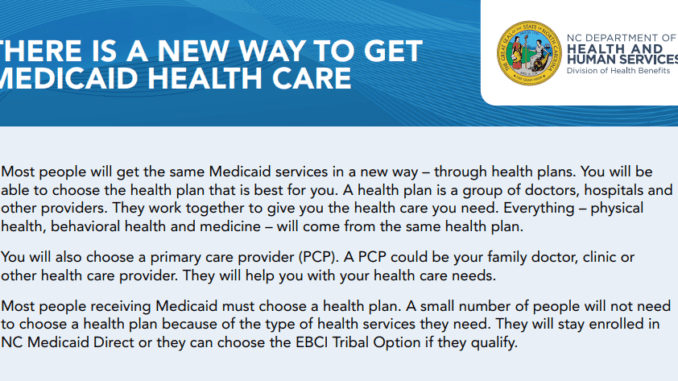
RALEIGH — A massive overhaul of North Carolina’s Medicaid system, passed in 2015, is finally going into effect, and open enrollment is currently underway. The sign-up process, which started March 15 and ends May 14, enrolls new beneficiaries to a managed care system, as the old “fee-for-service” system will be replaced this summer.
“Medicaid Transformation, after several delays, appears to be on track for implementation on July 1,” N.C. Senate Health Appropriations Committee Co-Chair Joyce Krawiec (R-Forsyth) told NSJ in an email on April 5. “We expect results to be better health outcomes, greater access to care and lower costs.”
In 2015, the North Carolina General Assembly passed H.B. 372, Medicaid Transformation and Reorganization, now known as Session Law 2015-245. The purpose of the bill, according to its “intent and goals” sections, is to “provide budget predictability for the taxpayers of this State while ensuring quality care to those in need.”
The changes were set to go into effect earlier, but a 2019 budget stalemate between the Republican legislature and Democratic Gov. Roy Cooper delayed the transition.
State budget writers had been complaining for years about the unpredictability of N.C.’s fee-for-service model of Medicaid. There were frequent budget overruns by the program because the costs were not known until providers and Medicaid administrators negotiated the fees for each service provided to each beneficiary.
Other states had success in moving to a “managed care” model in which Medicaid would pay a flat rate to companies, called Managed Care Organizations (MCOs), per beneficiary for managing the care of those patients. The companies are responsible for overruns past what they are paid to manage the care of that patient, incentivizing them to prevent waste and to focus on the overall health of the beneficiaries through preventative care. Due to the success of this approach, the majority of states now use managed care rather than the fee-for-service model.
“Beneficiaries will also have a Care team. I believe this will result in much better health outcomes,” Krawiec said. “Beneficiaries will have choices in the providers they have access to. During the sign up period, they are able to choose the providers they wish to have. This has not been possible in the past.”
Six MCOs were selected by the N.C. Department of Health and Human Services (NCDHHS) in a competitive bidding process and together will receive $6 billion to manage the care of around 2 million North Carolina Medicaid beneficiaries. Four of the MCOs will offer plans statewide — AmeriHealth Caritas of North Carolina, Blue Cross and Blue Shield of North Carolina, UnitedHealthcare of North Carolina and WellCare of North Carolina. Another, Carolina Complete Health, Inc., will offer care only in three designated regions.
The final MCO is Cherokee Indian Hospital Authority, which will be offering the Eastern Band of Cherokee Indians (EBCI) Tribal Option for their recognized members only. Unlike the other five, who are offering prepaid health plans, the ECBI Tribal Option will be limited to case management.
Because of the large amount of money on the line, the bidding process to be one of these MCOs became very competitive and controversial. Aetna narrowly lost in the scoring system to rival Blue Cross Blue Shield and filed a lawsuit to get the NCDHHS’s decision reversed.
The lawsuit alleged there were conflicts of interest between NCDHHS and BCBS which led to the scores being adjusted in BCBS’s favor, costing Aetna the contract.
“The Department unilaterally manipulated the scoring to ensure that its favored Offeror, [BCBS], would receive an award,” the suit stated. “Aetna was denied the award of a statewide contract by a mere razor-thin margin of 2.06 points, just 0.2 percent of the total possible points by a conflicted Evaluation Committee.”
Aetna’s case, in which two smaller bidders joined as well, was dismissed by state Superior Court.
The new system will officially launch July 1, 2021. Medicaid beneficiaries who do not select a plan by May 14 will have a plan selected for them on May 15.



